THE ULTIMATE GUIDE TO
LEGAL OUTSOURCING
CONTENTS

Introduction
To have a successful law practice in the 21st century, you must evolve and adapt your business model. You must be flexible and nimble to meet your clients’ needs. You must have the resources to power your firm – whether that means taking bigger cases, a higher volume of cases, additional practice areas, or having the resources to compete with bigger firms.
For many lawyers, the integration of hand-selected teams of on-demand virtual associates into their practices has been the key to their evolution and success.
What Is Legal Process Outsourcing
Legal Process Outsourcing (LPO) is the practice of delegating certain legal tasks, functions, and responsibilities to external service providers. The LPO industry has been experiencing significant growth as legal firms and corporations seek to minimize expenses and enhance efficiency.
The scope of LPO services is extensive, encompassing activities such as document review, contract administration, legal research, patent-related services, and litigation assistance. By relying on the expertise of dedicated LPO providers, organizations can concentrate on their primary functions and deliver superior value to their clients while adhering to the legal profession’s stringent quality and confidentiality requirements. LAWCLERK is one of these firms.
How to Grow Your Practice and Profits
There are only 24 hours in the day to work, and if you want to do something crazy like sleep or see your friends and family, then there are far fewer hours to work. This means that to grow your firm and profits, you need to leverage the time of other lawyers.
Traditionally, this was done by hiring full-time associates whose revenue from their billings were traditionally divided 1/3 to compensate the associate, 1/3 to cover their overhead expenses, and 1/3 for your profit. This means that if you bill your associate’s time at $225 per hour, $75 of that $225 should be allocated for their pay, $75 should be allocated for overhead, and $75 should be realized as your firm’s profit. But this only works if your associate is busy full time and if you collect all of their billed time, which is rarely the case.
When your associate is not busy full time and when you collect less than 100% of their billed time, the 1/3 that is supposed to be your profit ends up being consumed to pay the associate’s salary and benefits.
There is a better way! By using freelance lawyers, you can have the benefits of leveraging the time of associates without the overhead, commitment, and lost profits of full-time employees.
Using the same metrics, if you pay your freelance attorney $75 per hour and you bill your client $225 per hour for their services, your profit will be $150 per hour because you do not have to worry about paying salary and benefits when they are not working.
Importantly, consistent with the Supreme Court’s decisions in Missouri v. Jenkins, 491 U.S. 274 (1989) and Richlin v. Chertoff, 553 U.S. 571, 570 (2008) holding that you can upcharge paraprofessionals’ services, in Formal Opinion 00-420, the ABA Standing Committee on Ethics and Professional Responsibility explained that attorneys may bill the services of contract lawyers to their clients at prevailing market rates (verses the rate paid to the contract lawyer) as long as the overall hourly rates satisfy Model Rule 1.5(a)’s reasonableness requirement.

Thus, you can grow your practice and profits by leveraging the time of freelance lawyers without the debilitating overhead of full-time employees.
In the 2019 Altman Weil survey, developing an on-demand component to their lawyer workforce is among the top ten strategies big law is employing to improve firm sustainability. Notably, nearly half of the firms surveyed said that their new on-demand workforce strategies had already resulted in “significant improvement in firm performance,” with 46.6% reporting that it was too early to tell.
This ability to create a virtual team of on-demand lawyers to improve your firm’s profits is no longer reserved for big law. With new technology and legal outsourcing platforms, you can easily work with talented freelancers in your state and across the country to build your teams of virtual on-demand associates.

How to Make Money Leveraging the Time of Freelance Lawyers
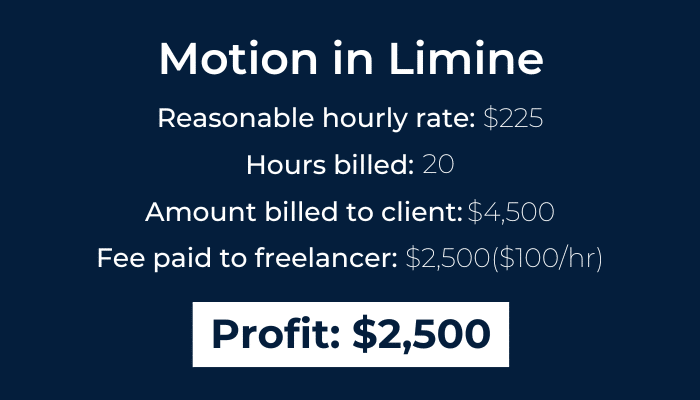
Let’s take a deeper dive into some real life examples of how to leverage the time of freelance lawyers to make more money.
Our first example assumes you need a complicated motion in limine drafted (perhaps a Daubert motion). You could draft it yourself and consume days of your valuable time or you could have an experienced freelance lawyer draft it for you, thereby leveraging their time and allowing you to focus on meeting with potential clients, marketing, and growing your business.
Let’s look at the economics. If it takes your freelance attorney 20 hours to complete the complex motion and you bill their time to your client at the reasonable market rate of $225 per hour, the total billed to the client is $4,500. If you paid the freelance lawyer $2,000 ($100 per hour) to prepare the motion, your profit is $2,500, plus, you saved yourself 20 hours that you can better spend on developing your practice!
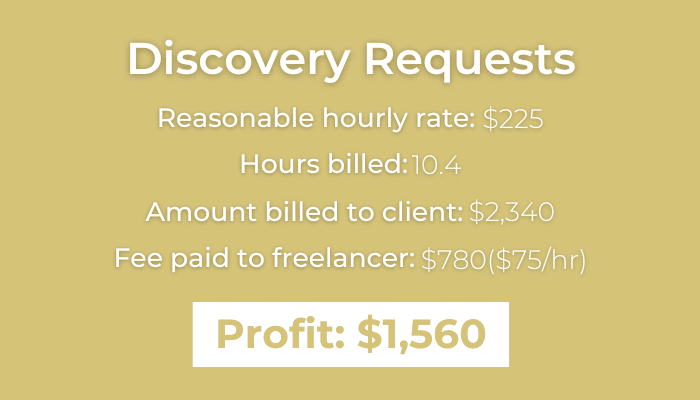
If you litigate, whether in family court, state court, or federal court, discovery is a necessary evil. Even if you do not hate doing discovery, there is no chance you think drafting or responding to requests for documents, interrogatories, or admissions is the best use of your time. This is the perfect type of work to outsource.
First, instead of procrastinating until the end of the discovery period, you can keep the other side on their toes and control the pace of the case by quickly propounding your discovery. Second, you can leverage the freelance lawyer’s time to make a profit for you while you spend your time focusing on your business and clients.

Can you make a profit if you bill on a flat fee basis? Yes! Say you charge $1,000 to prepare a lease or a trust and it takes you three hours to prepare it. This equates to a $333 hourly rate. If, instead of drafting it yourself, you pay a freelance lawyer $400 to prepare the lease or trust and you spend one hour reviewing and finalizing the lease or trust, your effective hourly rate is now $600. This is nearly double your effective hourly rate when you just do it yourself.

Find More Success by Building Your Hand-Selected Teams of On-Demand Virtual Associates
Attorneys that have embraced legal process outsourcing and incorporated it into their business model are building teams of on-demand attorneys to work with on a consistent basis. This enables them to take more cases, a wider variety of cases, and bigger cases, while allowing them to focus on growing their business.
By incorporating legal outsourcing into your firm, you can take on bigger cases because you are not limited by “bandwidth.” The elasticity of the on-demand virtual team of associates allows you to work with as many attorneys as you need for any given case – to flex up when you need an army of attorneys. As Tom Howlett, a small firm plaintiffs’ attorney explained, by using his team of on-demand virtual attorneys “I have the ability to leverage the kind of resources that some of my big firm opponents have.”
In another example, a boutique firm was up against AmLaw100 firms in a billion-dollar litigation. The case involved more than four million pages of documents that had to be reviewed and the material information synthesized in a useful manner for depositions and motion practice. The firm created a master spreadsheet of the relevant information to be identified in the documents and utilized a small army of freelance attorneys to complete the document review. The ability to outsource this incredible volume of document review to their on-demand discovery team was integral to maintaining the case at the firm and providing excellent service to their client.
By creating your team of on-demand virtual associates to help you when, but only when, you need it, you will have the “bandwidth” you need to take on and successfully prosecute and defend bigger cases. You can also have the workforce to take on a higher volume of cases.
“The biggest thing is not just price control, it’s that I can have seven projects going at once. There’s no associate that can do that.”
Morris Fischer, Employment and Business Lawyer

Attorneys take different approaches in creating their ideal on-demand virtual associate teams. Some attorneys create teams by types of work, while others build their teams based on practice area. For instance, a small firm with a national education practice has developed one team of on-demand virtual associates that they work with to prepare substantive demand letters, another team to prepare their litigation briefs, and a third team to handle their appellate briefs.
Conversely, a solopreneur in the rural Midwest that practices both family and criminal law has developed a separate team of freelancers that specializes in each of these practice areas. By doing this, she always has her go-to attorneys with the experience she needs for a particular matter. In fact, she will often have the same attorney on her team handle the bulk of the written work for an entire case – from propounding and responding to discovery, to drafting the briefs, to preparing her hearing notes.
In short, by creating teams of on-demand virtual associates, you can ensure that you have the skilled workforce you need to scale your business, whether that is taking on a higher volume of cases or taking on larger cases, without the expense and limitations of a full-time associate.
Costs Avoided by Building a Virtual Team of Freelance Lawyers

When thinking about full-time employees, there are many considerations that simply do not exist when you are working with freelance lawyers. For full-time employees, you must consider:
- Whether you have enough work now and in the future to keep them busy full time.
- Whether they have the requisite experience to be valuable to you immediately or whether they will require significant training (i.e. your first-year vs. a fourth-year attorney).
- Whether the associate wants to be the workhorse you need or whether they will be focused on building their own book of business.
- Whether they will be loyal or will take your invaluable training and put up their own shingle and compete with you.
- Whether you can afford a full-time employee.
For many solopreneurs and small firms, number 5 can be particularly troubling because full-time employees are expensive! By using freelance lawyers, you can avoid these costs:
Recruiting
Unless you are fortunate enough to have a qualified candidate fall in your lap, you will need to recruit candidates. If you pay a recruiter or a staffing agency, their fee is usually 25% to 50% of the lawyer’s first year’s salary. According to Staffing Industry Analysts, Inc., U.S. legal staffing is a +$1 billion business.
Even if you do the recruiting yourself, you must take into account the cost to post your ad on whatever platform(s) you choose (Indeed, ZipRecruiter, Monster, etc.) and the numerous hours you will spend reviewing resumes, scheduling interviews, interviewing, and negotiating employment terms. If you spend 15 to 40 hours on this process and your hourly rate is $400 per hour, the cost for you to recruit an associate is $6,000 – $16,000, plus hard costs.
Salary
Salaries for entry level lawyers vary widely by location and experience. A review of information provided by US News and World Report, Above the Law, and Glassdoor, indicates that entry level salaries for full-time associates generally vary between $65,000 and $120,000, with some of the big firms paying upwards of $190,000.
Employment Taxes
In addition to your employee’s salary, you are also responsible for paying the employer portion of Social Security/FICA, Unemployment/FUTA, Medicare, and state unemployment taxes, in addition to worker’s compensation premiums.
Benefits
Most employees expect some form of benefits. These often include health insurance, life insurance, disability, and 401K. According to the September 2019 report from the U.S. Bureau of Labor Statistics, employers spend an average of $11.60 per hour per employee on benefits or $24,128 annually. This is in addition to salary and taxes. Your $65,000 associate is now costing you north of $90,000.
Space, Equipment, and Administrative Support
Full-time employees take up space (unless they work remotely) and need tools to work. This means you need to pay for office space, furniture, a computer and other office equipment, a phone and phone line, additional software licenses, and the list goes on. You may also need additional administrative support as your headcount increases. All of these costs are in addition to salary, taxes, and benefits.
Professional Dues and Insurance
You will also need to pay for malpractice insurance for your new lawyer, as well as their state bar dues, local bar association dues, and continuing legal education.
Training
If you hire a young associate, you will need to dedicate significant time to training them. Every hour you spend training is an hour you are not billing and thus another meaningful expense.
These mounting costs often preclude solopreneurs and small firms from being able to take advantage of the leverage model. This is why outsourcing to on-demand virtual lawyers is an ideal solution. Whether you want to work with a single attorney or to build your own hand-selected virtual team of attorneys, you can leverage their time and increase your profits without the debilitating expense of full-time employees. You can also avoid concern about needing to keep them busy full time, training costs, and conflicting objectives (workhorse vs. building their own book).
The Many Benefits of Delegating
Focus on the highest and best use of your time
If you own your practice, you are an entrepreneur. As an entrepreneur, you need to focus your time on improving and growing your practice. Whether it is client origination, client meetings, trial, case strategy – you need to focus your time on your highest and best use for your business. And you need to delegate the rest through outsourcing. You simply cannot work on your business and in your business at the same time.
Make more money
There are limited ways to make more money as a lawyer. One is to increase the fees you charge to your clients, which is necessarily capped at some point. The second is to leverage the time of other attorneys and technology. Full-time employees come with significant costs irrespective of how much revenue they produce and at slower times, can be a drain on profits. Freelance lawyers, on the other hand, are only paid when they are generating revenue for you and are therefore, a profit center!
“If you really want to grow as an entrepreneur, you’ve got to learn to delegate.”
– Richard Branson, Founder of Virgin Group
Be more profitable with contingency cases
To be profitable with contingency cases, you must be particularly cost sensitive. Hiring full-time associates is far more expensive than working with your team of on-demand associates. The cost savings is simple to calculate. Every dollar you save by not paying overhead (benefits, employee taxes, equipment, office space, etc.) is money in your pocket when you get paid on your contingency case.
Flexible staffing for your cases
By building teams of on-demand virtual associates to work with as needed, you can take on bigger cases, more complex work, or work outside of your core practice, because you know you have the workforce standing by to help you when (but only when) you need them.
“No person will make a great business who wants to do it all himself or get all the credit.”
– Andrew Carnegie, steel industry mogul
Grow your practice with flat fees
For many clients, the uncertainty of the cost of legal services precludes them from hiring a lawyer or from taking certain legal action. By using freelance lawyers, you can provide your clients with more certainty of pricing. Appeals, for instance, can be cost prohibitive. However, if you can confidently tell your client that the cost of an appeal will not exceed $10,000, the client may be more inclined to file the appeal. And you can be confident quoting that fee because you know that you will pay a freelance lawyer on your team $3,000 to draft the opening brief and $2,000 to draft the reply brief, leaving $5,000 available for your time to review and finalize the briefs.
If you want to do a few small things right, do them yourself. If you want to do great things and make a big impact, learn to delegate.
– John C. Maxwell, American author on leadership
Lower the cost of legal services and be more competitive in the market
Legal process outsourcing is often more economical than hiring attorneys because of the overhead employees add to your business. Those savings can be passed along to your clients, which gives you a competitive advantage.
Be Happier
Solopreneurs and small firms are under more pressure than ever to work constantly in order to make a profit. By using freelance lawyers, you can bring in extra help when you need it without the overhead of a full-time associate, thereby giving you more time to spend doing the things you love.
What Types of Work Can I Effectively Outsource to Freelance Attorneys?

Discovery That Can Be Outsourced
- Discovery plans
- Initial disclosures
- Requests for documents
- Interrogatories
- Requests for admission
- Objections & responses to discovery
- Subpoenas
- Document review
- Motions to compel & responses
- Motions to quash & responses
- Deposition preparation
- Deposition summaries
For more than a decade, “big law” has been outsourcing document review projects to contract attorneys both within the U.S. and abroad. In the last few years, big law has been expanding their use of contract/freelance lawyers and incorporating them into their business model to cut overhead. In fact, the 2019 Altman Weil survey reported that 31.3% of the “big law” firms participating have developed an on-demand component to their lawyer workforce to ensure sustainability of their firms.
The good news is that with new technology, it is not just big law that has the resources to outsource legal work. This means that virtually anything you draft, review, or prepare can be outsourced to a freelance lawyer. You simply need to ensure that you are competent to do the work (Model Rule 1.1) and you supervise your freelancer attorneys (Model Rules 5.1-5.3).
With the ease at which documents can now be shared, whether through your practice management software, dropbox, an outsourcing platform, or other similar systems, time consuming tasks like document review, due diligence, medical record summaries, and motion practice can now be efficiently completed by freelance attorneys.
Think of it this way, you are the quarterback of the case and your team of freelance lawyers will run the plays you call.
Sometimes the Hardest Part Is Just Getting Started
“Deciding what not to do is as important as deciding what to do.”
– Jessica Jackley, American businesswoman & entrepreneur
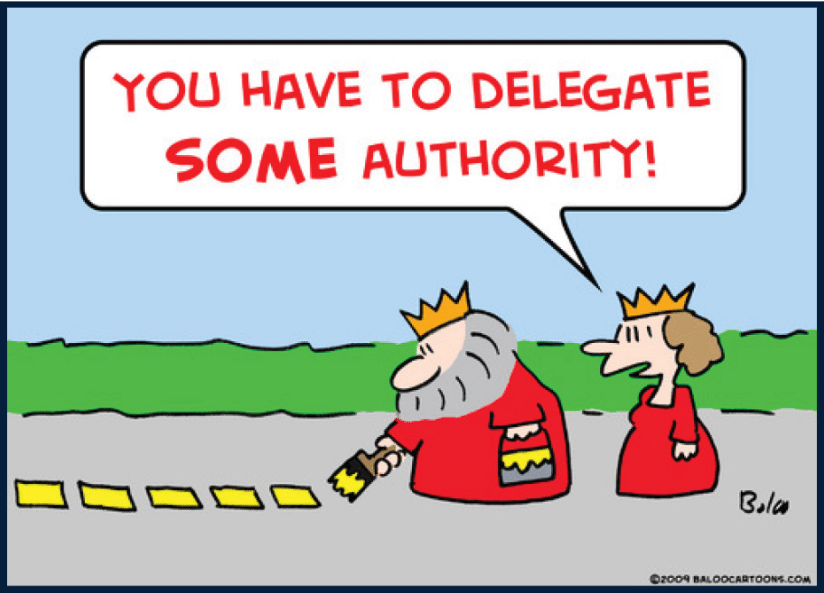
There is nothing more limiting to your success than trying to do it all yourself. If you are spending your time drafting, that is time you are taking away from powering your firm and addressing clients’ needs. Whether you want to hear it or not, the truth is that you are harming your business and your clients by refusing to delegate.
Here is a great way to get started, make a list of everything you do at work for one week. At the end of the week, highlight the things that truly only you can do. It is going to be a much smaller list than you expect and most of them relate to developing your business. These are the things you need to focus on — and you need to delegate the rest.
You can also take that list, your normal “to-do” list, or your prebills and ask yourself these questions:
“Are we limiting our success by not mastering the art of delegation? It’s simply a matter of preparation meeting opportunity.”
– Oprah Winfrey, media mogul
What Is Hanging Out There That You Never Find the Time to Get To?
We all have that work that sits on the corner of our desk or at the bottom of a pile that we intend to get to, but is consistently pushed to meet other immediate deadlines. The “I need to get to it but can’t this week” work is a great place to start.
What Is It You Dislike Doing the Most?
After you say “everything” — actually take a moment to really think about the work that you put off as long as possible. Stop making yourself miserable and delegate this work to someone who is happy to do it.
Do You Need Marketing Content, Blogs for Your Website, Publication, or Help With a Cle?
You can give outsourcing a try by having freelance lawyers draft blogs, CLE materials, and articles for you.
Do You Have a Complex Motion, Opposition, or Appellate Brief You Need Drafted?
Your highest and best use is not spending hours or days doing research and drafting. Have a freelance lawyer take the laboring oar on that complicated brief so that all you need to do is add your finishing touches.
The Skill and Experience of Lawyers Looking To Freelance Will Amaze You
You may be wondering what lawyer wants to freelance. Let me share some astonishing facts with you that hopefully will resonate as you think about your colleagues over the years. 57% of lawyers in private practice stop practicing within five years. These are attorneys that went to law school, passed the bar, possibly had a state or federal clerkship, and then worked for a firm or the government for years. I have so many brilliant colleagues that were excellent attorneys but found being a firm or government lawyer incompatible with also being a parent and ultimately left the practice of law. These talented men and women are rejoining the legal force as freelance attorneys because they can work when their kids are at school, nights, and weekends, without the commitment of full-time employment.
Here is another staggering statistic, at the 250 largest law firms, there is less than a 30% chance of making partner. This is often called the “big law up or out” system. These highly skilled lawyers without the necessary million-dollar book of business to become partner are leaving big law and many are hanging their own shingle and freelancing as they build their firms or developing freelance careers as they are keenly appreciative of its flexibility after big firm burnout.
This may shock you, but millennials are now 25 to 39 years old. While a remarkable over generalization, this is an entire generation of attorneys, many with more than a decade of legal experience, that are more concerned with work life balance than previous generations. Many of these talented lawyers are building freelance businesses for themselves so that they have total flexibility in their schedules, the ability to work and travel, and ultimate control over the type of work they do and their workload.
A new trend is also developing with retired lawyers choosing to freelance. Whether motivated by the need to “stay in the game,” a love for the law, or financial considerations, attorneys with decades of experience are offering their sage advice on a freelance basis.
There are many other life circumstances that are conducive to freelancing. Military spouses, for instance, are well-suited for a freelance career as they must frequently move. Attorneys that have opened their own practices and are working on developing their book of business often supplement their income by freelancing. And law school professors make additional money during their summers off.
The “gig economy” has reached legal and the number of highly-skilled lawyers looking to work on a freelance basis is exponentially increasing as they realize they can put their education and training to work in a way that is conducive to their families and lives.
Practical Advice on Building Your Team of On-Demand Associates

Finding Your Team: Doing It Yourself v. LAWCLERK
There are a number of ways to go about it. You can ask your colleagues or law school career departments for recommendations of attorneys that are looking to freelance or you can google for attorneys that have built websites to conduct their freelancing businesses. If you take these avenues, you will need to:
- Undertake your own vetting: Are they barred and in good standing? Can you review a resume? Do they have a writing sample available? Do they have reviews/testimonials?
- Prepare and enter into a confidentiality and non-disclosure agreement.
- Complete a conflicts check.
- Ensure you are maintaining client confidentiality.
- Determine how you will exchange documents safely and security.
- Determine how you will pay the attorney for their services.
- Create and obtain a timesheet so that you can bill your client for their services.
- Handle all tax reporting.
Perhaps a better way is to use a company designed to help you implement your law firm outsourcing strategy. We built LAWCLERK to connect you with our extensive network of freelance lawyers and to give you the systems and tools you need to seamlessly select and work with your chosen on-demand attorneys. LAWCLERK handles the vetting, payment, and tax reporting, as well as provides a mechanism for you to bill your client.
LAWCLERK additionally ensures that a confidentiality and non-disclosure agreement is executed for every project, provides a two-tier conflicts check process, provides a secure and encrypted chat and document library to allow you to safely and securely share documents, and allows you to build your hand-selected teams of on-demand associates to work with.
Are You Looking to Hire an Attorney?
Are You Looking for Legal Work?
There are also companies that help you find on-demand attorneys to work with and usually at your office. These companies, such as Montage Legal, feel a bit more like staffing companies and tend to be focused on big law, but they are a good resource if you are looking for someone to work in your office for a limited duration.
When considering your options, you should inquire whether the company is serving only attorneys and therefore attuned to the ethical and practical considerations to the practice of law, whether they give you a dedicated advisor to assist you in incorporating outsourcing into your practice, and whether they offer a satisfaction guaranty. LAWCLERK checks each of these boxes.
Revise Your Engagement Agreement
It is a good idea to revise your engagement agreement to discuss your use of freelance lawyers and the rates at which they will be billed to your clients.
If you are a solo attorney, perhaps you could use some variation of this sample language in your agreement:
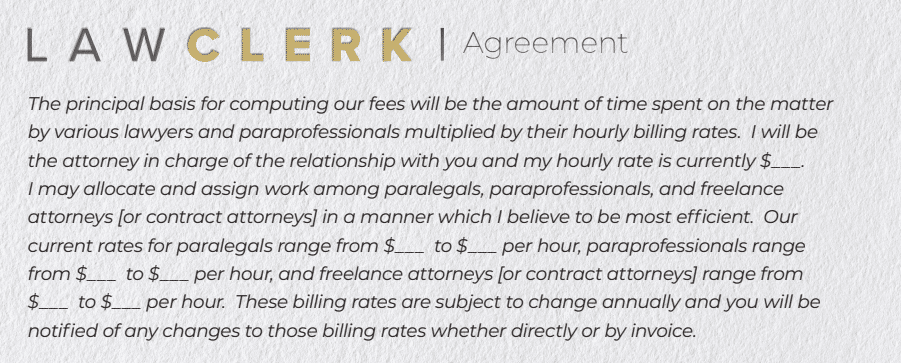
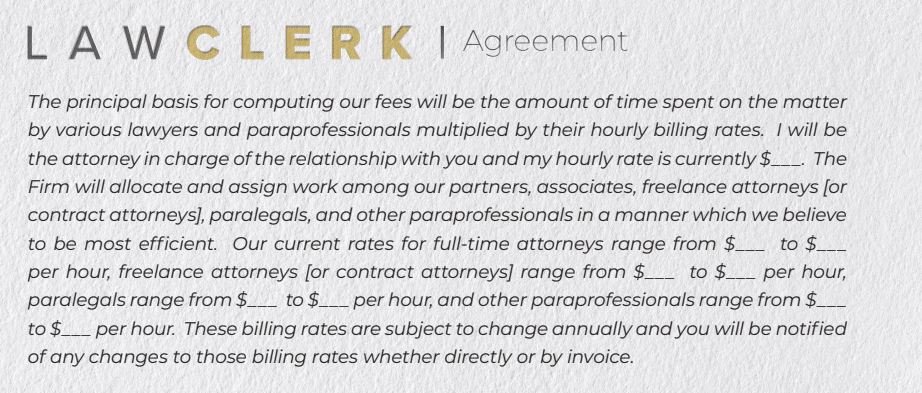
Communication Is Key
Whether you are working with someone in the next office or working with someone in another state, communication is key to a good working relationship. It doesn’t matter whether you communicate by messaging systems, slack, email, text, or phone, it only matters that you communicate. Be sure you and your on-demand team are clear on what needs to be done, expectations, and deadlines.
When working with my on-demand team, after I assign the project, I upload the documents they need to review (or the audio recording from my client meeting), send a message with the pertinent facts (sometimes I dictate this and upload the audio file), and invite a short call to discuss the project. After the call, I also send a note reminding them to be sure to let me know if they have any questions. With these simple steps, I ensure that there is clarity on the project, expectations, and deadlines, as well as open communication.
Ideas for Delegating
While certainly not comprehensive, here are a few ideas of work you should delegate to your team of virtual associates:
APPELLATE
- Research re: procedural issues
- Memos re: likelihood of success in appeal
- Supersedeas bond research/analysis
- Transcript summaries
- Briefing re: interlocutory appeals
- Briefing re: dismissal of appeal
- Motions seeking discretionary review
- Opening briefs
- Response briefs
- Reply briefs
- Excerpts of record/appendices
- Motions to strike & responses
- Writs of habeas corpus
- Writs of certiorari
- Writs of mandamus
Commercial Litigation
- Demand letters
- Complaints
- Motions to dismiss & responses
- Motions to transfer venue & responses
- TRO applications & responses
- Document review
- RFPs, Interrogatories & Admissions
- Discovery responses
- Motions to compel & responses
- Motions to quash & responses
- MSJs, responses & countermotions
- Motions in limine & responses
- Trial/bench briefs
- Jury Instructions
- Motions for reconsideration/new trial & responses
Family
- Prenuptial & postnuptial agreements
- Research memorandums
- Discovery & discovery responses
- Motions re: modification of custody or support & responses
- Motions to enforce custody or support orders & responses
- Adoption documents
- Financial disclosure statements
- Motions to dismiss divorce modification
- Settlement briefs
- Trial/bench briefs
- Motions in limine
- Motions for reconsideration/new trial & responses
- Consent orders
immigration
- Research memos
- Visa petitions
- Letters of recommendation
- Support & expert letters
- Employment letters
- Memos re: social group for asylum merits hearings
- BIA briefs
- Motions to transfer venue & replies
- Motions to terminate proceedings & replies
- Eligibility briefs
- NIV (212(d)(3)) waiver applications & memorandum of law
- NOID responses
- Asylum hearing memos & preparation
- Writs of mandamus
- Writs of habeas corpus
- Responses to motions to dismiss
- Motions in limine & responses
- Circuit appellate briefs & replies
- Motions for stay pending appeal
Personal Injury
- Demand letters
- Research memos
- Complaints
- Motions for leave to amend
- Response to motions for forum non conveniens
- Responses to motions to dismiss
- RFPs, Interrogatories & Admissions
- Objections & responses to discovery
- Motions to compel/quash discovery
- Medical record summaries
- Deposition summaries
- Expert designations
- Settlement letters/mediation briefs
- Demurrers & responses
- MSJs, countermotions & responses
- Daubert & other motions in limine
- Motions to strike & responses
- Trial statements/pre-trial briefs
- Jury verdict research
- Jury instructions
- Judgments & memorandum of costs
Criminal
- Personal restraining petitions & responses
- Letters to the prosecutor or court
- Summaries of criminal history
- Motions to dismiss & replies
- Motions for pretrial diversion & replies
- Motions for a finding of innocence
- Summaries of evidence, discovery needed, & proposed witness questions
- Prepare investigator interview questions
- Motions to expunge & replies
- Motions to quash & replies
- Motions to suppress & replies
- Objections to reports & recommendations
- Motions to modify order & replies
- Motions to set aside judgment & replies
- Motions for reconsideration/new trial & responses
- Plea agreements
- Writs of habeas corpus
- Jury instructions
HEALTH
- Research memoranda
- Medical office leases
- License agreements
- Purchase & sale agreements for medical companies & practices
- Employment agreements
- Feasibility opinions
- Medical website disclosures/disclaimers
- Merger documents for medical & dental companies/practices
- Legal opinion letters for medical & dental companies & practices
- Guidance letters for medical & dental companies
- Practice-related letters for medical practices & professionals
- Discovery requests & responses
- Compliance policies/manuals
- Compliance checklists
- Responses & settlement proposals re: Medicare/Medicaid/Stark/etc. violations
Estate Planning & Probate
- Prenuptial & postnuptial agreements
- Wills
- Powers of Attorney
- Trusts & trust modifications
- Deeds of trust & liens
- Living wills & HIPPA directives
- Beneficiary agreements
- Financial record review & accounting
- Court supervised accountings
- Research re: optimal estate planning vehicles, gifting, property rights, etc.
- Document summaries
- Letters of administration
- Propound & respond to discovery
- Motions for reconsideration & responses
- Motions to substitute personal representative & responses
- Petitions to admit will to probate
- Petitions for family allowances & responses
- Other briefing in probate cases
Employment/Labor/Education
- Research memoranda
- Independent contractor/employee analysis
- Employment agreements
- Personnel policies & procedures manual
- Employee handbooks
- NDAs & non-circumvention agreements
- Employee stock option plan (ESOP)
- TRO for former employees
- Responses to DHS revocation of security clearance
- Demand letters
- Complaints (FMLA, retaliation, etc.)
- Mediation briefs
- Discovery plans
- Propound & respond to discovery
- Responses to EEOC employer position statements
- MSJs, countermotions & responses
- Pre-trial & post-trial briefs
Intellectual Property
- Copyright & other research memos
- Trademark searches
- Trademark applications
- Opposition to trademark application
- Responses to USPTO action
- Patent applications
- Purchase & Sale Agts. for IP
- Licensing & affiliate agreements
- Software subscription agreements
- Terms of service & privacy policies
- Research memos
- Demand letters & responses
- Cease & desist letters & responses
- Complaints (under
- Lanham Act & otherwise)
- Motions for TRO & preliminary injunction & responses
Business/Corporate
- Corporate resolutions
- Operating agreements & bylaws
- CC&Rs & HOA bylaws
- Stock agreements
- Loan documents
- Agreements & contracts
- Contract review
- Redemption agreements
- Purchase & sale agreements
- Deeds of trust & lien research
- Survey reviews
- Opinion letters
- Vendor & employee letters
- Leases & notices terminating leases
- Real property transfer documents
Bankruptcy
- Avoidance action analysis
- Research re: eligibility to file Ch. 7 & means test
- Preparation of proofs of claim
- Motions to lift the stay & responses
- Motions to appoint a trustee & responses
- Motions to convert/dismiss & responses
- Computation of plan payments
- Chapter 11 & 13 plans
- Responses to confirmation objections
- Motions re: exemptions & responses
- Motions re: estate property & responses
- Motions for surcharge & responses
- Adversary complaints
- Adversary discovery & motions
Just Do It

There is no better way to find out how outsourcing will help you grow your practice than giving it a try. So, as Nike says “Just Do It!”
Talitha Gray Kozlowski
15+ year bankruptcy attorney, partner at Garman Turner Gordon, and co-founder of LAWCLERK.













